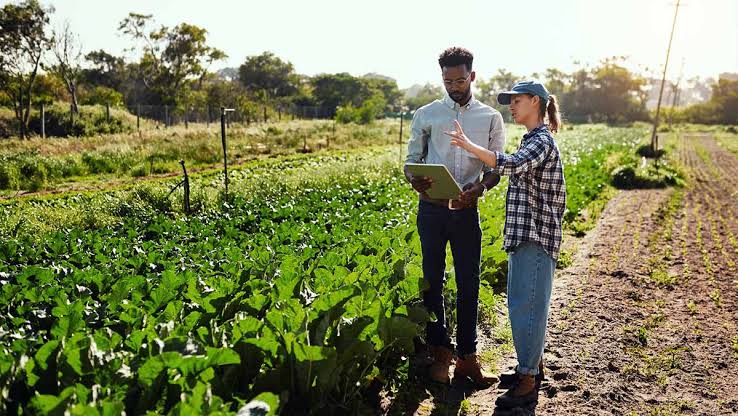The Agriculture Department plays a vital role in supporting farmers and ensuring the growth of our nation’s agricultural sector. Its primary focus is on fostering sustainable farming practices, enhancing crop yields, and promoting the overall well-being of farmers.
Within the Agriculture Department, various branches work cohesively to address different aspects of farming. These branches often collaborate to implement policies and programs that benefit both farmers and consumers.
One crucial function of the Agriculture Department is to provide farmers with access to valuable resources and information. This includes disseminating knowledge about modern farming techniques, crop management, and pest control. By offering training programs and workshops, the department empowers farmers to adopt efficient and eco-friendly practices.
Moreover, the Agriculture Department plays a pivotal role in research and development. Scientists and researchers within the department work tirelessly to discover innovative ways to improve crop resilience, enhance soil fertility, and mitigate the impact of climate change on agriculture. Their findings contribute to the advancement of sustainable farming methods, ensuring long-term productivity.
The department also actively participates in market analysis and trade policies related to agriculture. By monitoring market trends and facilitating fair trade practices, it helps farmers receive equitable prices for their produce. This, in turn, contributes to the overall economic stability of rural communities.
In addition to its domestic responsibilities, the Agriculture Department is often involved in international collaborations. Through partnerships with other countries and international organizations, it aims to share knowledge, technology, and best practices, fostering a global community focused on agricultural development.
Agriculture, being a multifaceted sector, requires a comprehensive approach to address challenges and capitalize on opportunities. The Agriculture Department serves as a central hub for coordinating efforts that span from farm to market. Its commitment to the welfare of farmers and the sustainability of agriculture reflects its crucial role in shaping the future of our food systems.
In addition, the Agriculture Department is a cornerstone of our nation’s progress in the realm of farming. Through its diverse functions, it ensures that farmers are well-equipped, markets are fair, and agriculture remains a sustainable and resilient pillar of our economy.
The Agriculture Department’s involvement extends beyond the cultivation of crops; it also oversees animal husbandry and fisheries, contributing to the holistic development of the agri-food sector.
Within the sphere of animal husbandry, the department implements programs to improve livestock breeds, enhance animal nutrition, and prevent the spread of diseases. This focus on animal welfare not only supports farmers engaged in livestock farming but also ensures the production of high-quality meat, dairy, and other animal products for consumers.
In the realm of fisheries, the Agriculture Department is responsible for sustainable management practices. This includes regulating fishing activities, promoting aquaculture, and conserving aquatic ecosystems. By maintaining a balance between exploitation and conservation, the department safeguards the livelihoods of fishermen and the availability of fishery resources for future generations.
Furthermore, the Agriculture Department actively engages with rural communities to understand their unique challenges and needs. By initiating community development projects, it seeks to enhance the overall quality of life in rural areas. These projects may include infrastructure development, education programs, and healthcare initiatives, all of which contribute to the socio-economic upliftment of farming communities.
In times of natural disasters or unforeseen challenges, the Agriculture Department plays a crucial role in providing relief and support. Whether it’s through crop insurance programs, emergency funds, or disaster management strategies, the department aims to help farmers recover from setbacks and build resilience against future uncertainties.
As technology continues to advance, the Agriculture Department embraces innovation to modernize the farming landscape. Initiatives related to precision agriculture, smart farming, and the use of agricultural drones are examples of how technology is integrated to optimize resource use and increase productivity.
However the Agriculture Department serves as a guardian of our nation’s food security, rural prosperity, and environmental sustainability. Its multifaceted approach, encompassing crop cultivation, animal husbandry, fisheries, community development, and technology integration, underscores its commitment to fostering a robust and resilient agricultural sector. In doing so, it ensures that agriculture remains not only a source of livelihood for millions but also a cornerstone of national development.
Read Also: Chow Chows: Description, Health, Origin and Care Guide
The Aims and Objectives of Agriculture Department

The Agriculture Department operates with a set of clear aims and objectives aimed at fostering sustainable agricultural practices, supporting farmers, and ensuring food security. Here are some overarching goals:
1. Promoting Sustainable Farming Practices: Encouraging and educating farmers about eco-friendly and sustainable agricultural methods to preserve soil health and minimize environmental impact.
2. Enhancing Crop Productivity: Implementing research-driven initiatives to improve crop yields through the development of high-yielding varieties, efficient irrigation systems, and advanced cultivation techniques.
3. Ensuring Food Security: Strategizing and implementing policies to guarantee a steady and secure food supply for the nation’s growing population, with a focus on balanced nutrition and accessibility.
4. Supporting Farmer Welfare: Providing financial assistance, subsidies, and insurance programs to safeguard farmers against economic uncertainties and natural disasters, ensuring their overall well-being.
5. Research and Development: Conducting and supporting agricultural research to innovate and advance technologies that enhance farming practices, crop resilience, and animal husbandry.
6. Market Regulation and Fair Trade: Monitoring and regulating agricultural markets to ensure fair pricing for farmers, prevent market manipulation, and maintain a stable economic environment for agriculture.
7. Disease Control and Prevention: Implementing measures to control and prevent the spread of diseases among crops and livestock through timely vaccinations, biosecurity protocols, and quarantine measures.
8. International Collaboration: Engaging in collaborative efforts with international organizations and other countries to share knowledge, technology, and best practices for mutual benefit and global agricultural development.
9. Community Development: Initiating projects aimed at improving rural communities, including infrastructure development, educational programs, and healthcare initiatives to enhance the overall quality of life.
10. Disaster Management and Relief: Developing and implementing strategies to provide quick and effective relief to farmers in the face of natural disasters, ensuring a rapid recovery and rebuilding process.
11. Technology Integration: Embracing and promoting the integration of technology in agriculture, including precision farming, smart agriculture, and the use of modern tools to increase efficiency and productivity.
12. Conservation of Natural Resources: Advocating and implementing practices that promote the responsible use of natural resources, including water conservation, soil preservation, and biodiversity protection.
These aims and objectives collectively underscore the Agriculture Department’s commitment to fostering a resilient, sustainable, and productive agricultural sector that meets the needs of both present and future generations.
Read Also: Bull Terrier Dog Breed: Description, Health, Origin and Care Guide
Economic Benefits of Agriculture Department

The Agriculture Department contributes significantly to the economic well-being of a nation through various channels, generating substantial economic benefits. Here are some key aspects:
1. Employment Generation: Agriculture is a major source of employment, providing livelihoods for a significant portion of the population. The sector includes farmers, farm laborers, and those engaged in related industries, such as food processing and distribution.
2. Contribution to GDP: The agricultural sector makes a substantial contribution to the Gross Domestic Product (GDP) of a country. A thriving agricultural industry positively influences the overall economic performance.
3. Foreign Exchange Earnings: Agriculture often plays a crucial role in international trade. Exporting agricultural products contributes to foreign exchange earnings, helping to stabilize the country’s balance of trade.
4. Market Stability: The Agriculture Department’s market regulation initiatives contribute to price stability, ensuring fair prices for both farmers and consumers. This stability has a positive impact on the broader economy.
5. Rural Economic Development: Agriculture is often the primary economic activity in rural areas. The Agriculture Department’s support for rural development projects stimulates economic growth in these regions, reducing urban-rural economic disparities.
6. Input to Agri-Industries: The agricultural sector provides raw materials to various agri-industries, such as food processing, textiles, and biofuels. These industries, in turn, contribute significantly to the economy.
7. Innovation and Technology Transfer: Research and development initiatives within the Agriculture Department lead to technological advancements in farming practices. The adoption of modern technologies enhances productivity, contributing to economic growth.
8. Entrepreneurship Opportunities: Agriculture creates opportunities for entrepreneurship, with individuals establishing businesses related to agribusiness, agro-processing, and value addition to agricultural products.
9. Infrastructure Development: The Agriculture Department’s projects often involve the development of rural infrastructure, including roads, irrigation systems, and storage facilities. This not only supports agriculture but also enhances overall economic development in rural areas.
10. Tax Revenue: The economic activities associated with agriculture, including production, processing, and trade, generate tax revenue for the government. This revenue contributes to funding public services and infrastructure.
11. Climate Resilience and Mitigation: Sustainable agricultural practices promoted by the Agriculture Department contribute to climate resilience and mitigation efforts. This is increasingly recognized as a valuable economic benefit, considering the long-term impacts of climate change on various sectors.
12. Social Stability: A robust agricultural sector contributes to social stability by providing a secure source of food and livelihoods. This stability is a foundation for broader economic development and prosperity.
In summary, the Agriculture Department’s activities have far-reaching economic benefits, encompassing employment, GDP contribution, foreign exchange earnings, market stability, rural development, innovation, entrepreneurship, infrastructure development, tax revenue, and social stability. These collective contributions make agriculture a cornerstone of a nation’s economic prosperity.
Read Also: Microbiological Examination of Water
